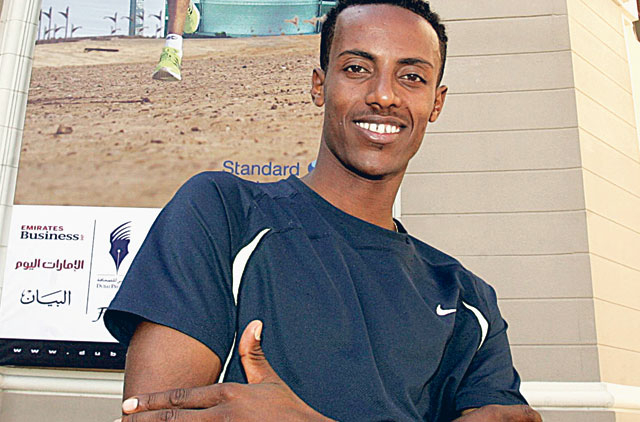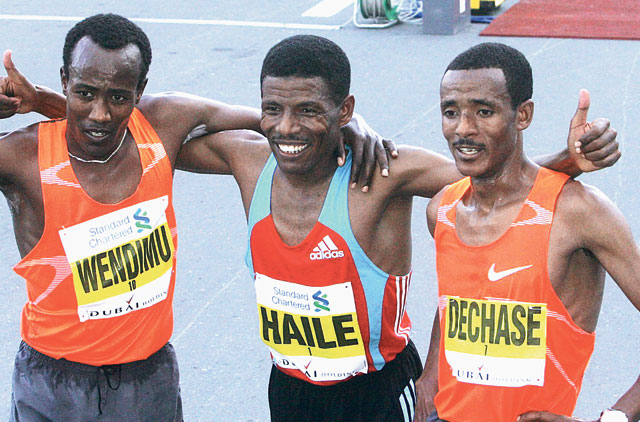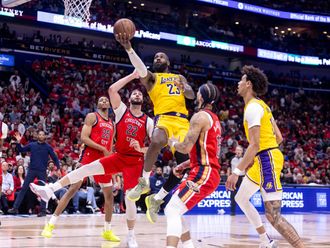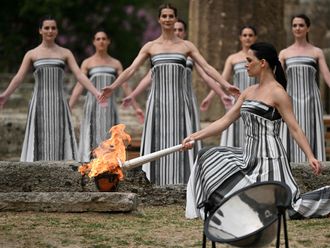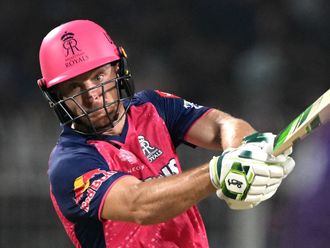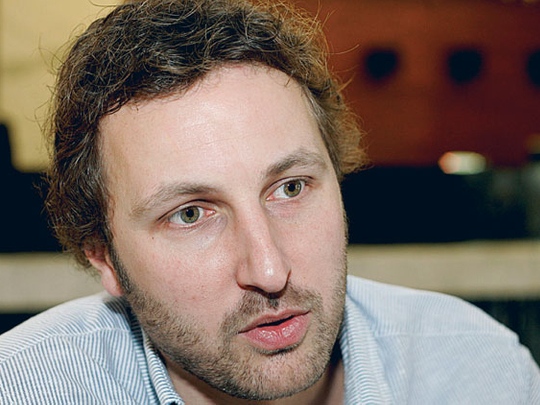
Dubai : Dereje Tesfaye Gebrihiwot wasn't expected to win the Standard Chartered Dubai Marathon. He wasn't even expected to finish the 42.195km race. His brief was to be the last pacemaker to Haile Gebrselassie with instructions to pull out after 30km which he dutifully did. Fact is, this young Ethiopian had more to gain by complying with the well-rehearsed tactics than finishing the race.
His is the world of pacemakers, of men who have a significant role to play while champions like Gebrselassie go about their business of breaking world records.
One of many
Gebrihiwot wasn't alone though. The likes of Sammy Kipligo Kosgei, Josphat Kamzee Jepkopol, John Pkerker Kales and Fabiano Joseph Naasi were also there to pace the marathon world record holder who was making his third attempt in Dubai.
Two more Kenyans, Joseph Pkerker Ngolepus and Emmanuel Samal, were flown in on the night before the race to add to the numbers. In the end, a stiff back put paid to the best-laid plans, but more about that later.
The debate over the use of pacemakers is a long-drawn one, dating back to as early as the days of Roger Bannister, when he was supposed to have used two pacemakers for the historic sub-four minute mile run in 1954.
Boston Marathon, the world's oldest marathon has never used pacemakers and the New York Marathon banned pacemakers about three years back. The bone of contention has been if the pacemakers can run as fast as the elite runners themselves, they might as well go on and win it and not drop out.
For the third year running in Dubai, Gebrselassie failed to collect the $1 million jackpot.
In 2008, it was a case of the early pacemakers going too fast, while in 2009, it was rain that put paid to his hopes.
This year, he put his disappointing 2:06:09 down to falling asleep on his stomach while watching TV the night before!
The backache resulted in the early pacemakers like Fabiano - who himself pulled out after 5km with what appeared to be a foot problem - and Kales, who pulled out after 20km, starting out slowly. Later Gebrihiwot joined Gebrselassie up front, as he tried to increase the pace which had dropped well below the required rate, but to no avail.
Too much too soon
"I had just run the Fukuoka Marathon the previous week and I wasn't going to finish another marathon so soon anyway," the 22-year-old pacemaker told XPRESS, when asked about his role in the set-up.
"Besides, I had paced for Haile before at the one hour race in Hengelo in May last year till the 10,000m, so I knew what was expected of me," he added.
Both Gebrselassie and Gebrihiwot along with eventual runner-up Chala Dechase Beyene of Kenya are managed by the Dutch agency Global Sports Communication which is headed by Jos Hermens.
Manager Valentijn Trouw said of the pacemakers: "These are youngsters who aim to become champion athletes themselves and what better way to do it than setting the pace for Haile.
"Guys like Kales, Kamzee, Fabiano and Kosgei are half-marathon guys, so it is a good experience for them as they seek to move on to the full marathon."
Trouw also mentioned the monetary benefits of sticking to the plan, but what he didn't mention was the pecking order that is followed religiously.
Things were plainly obvious to everyone during the last few kilometres the way Dechase was egging Gebrselassie on towards the world mark without himself ever trying to overtake the great man. "I had a leg injury and besides Haile is an experienced runner," was all Dechase said.
As for Gebrselassie himself, he sees nothing wrong in the concept.
"Pacemakers are a must in marathon. They give you an idea of the speed at which you should run. But for them it would be difficult to go for world records," he said.


